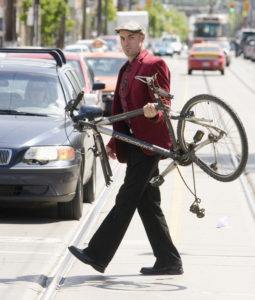Cyclists are Morally Justified in Breaking the Rules
It’s funny how some right-wing politicians always have a go at punishing good behaviour.
Toronto Councillor Stephen Holyday’s proposal to introduce bike licenses is at best, as he suggests, based on the naïve notion that they’ll finance bike lanes the city needs. At worst, it’s the latest ruse to cast cyclists as outlaws who need to be reined in by more rigorous regulations.
Supposedly progressive cities already have bike lanes to encourage cycling and lessen congestion. Many Torontonians, however, drive just a few kilometres to school and work. They could commute by bike instead, if councillors shifted their attention to assuring their safety.
I write from Paris, where the city council has just voted to pedestrianize a major road alongside the River Seine, to the predicted outrage of long-cossetted drivers. It follows a series of such measures, including the transformation of la Place de la République, whose roads have been turned into a massive public square.

Me and my broken bike after I spent two months in hospital.
Activists are struggling to claw back precious public space on both sides of the Atlantic, but in Paris they’ve been supported by mayors (Anne Hidalgo and her predecessors) who have overridden vested interests, backed alternatives to automobiles and cut down on congestion.
You can see the results. Car use has declined by over a quarter since 2001; a comprehensive bike lane network stretches across the capital; and the city has fleets of bike and electric car rentals, with more plans in the pipelines. And Paris is not even at the cutting edge.
A trip to Toronto on the other hand, is like going back in time. Among the city’s approximately 5,000 kms of roadways, there are a little more than 130 kms of bike lanes, with each additional centimetre hotly contested.
Such an inefficient and inequitable system could only be justified by a deluge of propaganda spewed by the automobile lobby and the politicians who genuflect to them. Any attempt to make room for alternatives is described in breathless hyperbole, as part of some mythical “war on the car.”
In reality of course, if there is any ‘war’ in Toronto, it’s against cyclists.
Having cycled in other cities without incident, it was in my native Toronto that I ended up in hospital for two months. Riding down a side street in the west end, I was hit from behind by a truck and dragged under it for dozens of meters. The courts became a theatre for comical understatement (and bad grammar) when the driver was fined $85 for making a “turn not in safety.”
In studies in Toronto and abroad, drivers have been found responsible for the majority of collisions with cyclists and pedestrians, due to aggressive or distracted driving. This is why drivers need to be licensed: they are in possession of a deadly machine, which seems to be getting deadlier. With 64 dead, last year marked the highest number of fatalities on Toronto’s roads in five years.
And yet, debate continues to focus on cyclists’ behaviour, as though we alone roll through stop signs or change lanes without signalling. That behaviour is a nuisance for drivers to watch, but when the tables are turned, it can be fatal.
What’s more, taxpaying cyclists and pedestrians subsidise roads overrun by cars without any refuge for ourselves. It amounts to taxation without representation.
Which is why cyclists have no moral obligation to obey the rules of the road except those that ensure their safety and that of others. You probably had to re-read that, because one assumes that all of the rules are there to protect our safety. Indeed, laws that oblige us to stop at red lights and stop signs should be iron-clad for vehicles made of a tonne of steel. Bicycles pose no such threat – as can be seen in the number of fatalities wracked up every year.
Officials presiding over a system they know to be dangerous are accomplices to the “public health epidemic” in which 10 cyclists and pedestrians are struck by cars every day.
As herbivores of the urban jungle, we steer clear of cars to remain alive. Running a light before it turns green can put us out of the path of traffic and into pockets of relative safety. But this is decried by the driver – for whom rolling stops and texting while driving are presumably unproblematic – as the kind of anarchy that is really to blame.
Such self-serving narratives are to be expected from the incessantly seated, for whom everything in sight has been built, cleared, mowed down or manicured. They fail to grasp what it’s like to be outside of an all-encompassing auto-centric system.
Cyclists, relegated to the second-class side-lines where they are in danger of being ‘doored’ on one side or clipped on the other, have had to find other ways to ride in safety.
In the absence of bike lanes, we must abandon the idea that we benefit from any meaningful public service. We should refuse to pay the proportion of property tax devoted to road maintenance until they’re modified to serve all users. We should be clear that calls for “more studies” of the benefits of bike lanes are cynical delaying tactics, which ultimately cost lives.
Pampered motorists benefit from the political gamesmanship that makes a mockery of shared urban space. We are living in a two-tiered society, where politicians like Stephen Holyday continue to skew public priorities in favour of the lobbyists they serve, as crucial, life-saving infrastructure is put off for another time.
A mass boycott of the taxes that pay for such lob-sided infrastructure is the wake-up call we need for those who defend this iniquitous status quo.

